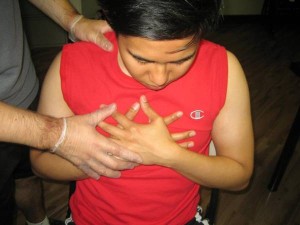Coronary artery disease (CAD) is a condition that involves diminished blood flow to the heart. This reduced flow of blood can weaken the heart and it will start to beat irregularly. There are various symptoms linked with coronary artery disease that you should be aware of.
Angina
The common symptom of coronary artery disease is angina. This feels like heaviness, tightness or pressure in the chest. Angina can start as a burning, aching or numbness in the chest. Aside from the chest, it can also be felt in the jaw, back, neck, left shoulder or arms.
The discomfort can go up into the right arm, down the fingers and into the upper abdomen. Oftentimes, the angina will cause minor pressure, discomfort or heaviness. Take note that women and elderly are more likely than men and younger individuals to experience this kind of angina. Angina is categorized as stable or unstable. With stable angina, it occurs during periods of exertion or stress and can last 2-15 minutes and vanishes with rest. As for unstable angina, it occurs when there is no demand placed on the heart and could not be relieved with rest. If you want to learn measures to ease this symptom, click here.

Other symptoms of coronary artery disease
Aside from angina, an individual with coronary artery disease can experience the following symptoms:
- Sweating
- Palpitations
- Shortness of breath
- Weakness
- Nausea
- Rapid heartbeat
- Dizziness
Is angina or heart attack?
In case the pain changes in feature, lasts more than 15 minutes or does not respond to nitroglycerin tablets prescribed by the doctor, the individual should seek medical care. It is possible that the individual is having a heart attack and requires immediate evaluation and prompt treatment.
Symptoms that might indicate angina or heart attack due to CAD
- Pain or aching in the upper body, abdomen, back or jaw
- Dizziness
- Numbness or discomfort in the upper body
- Nausea or vomiting
- Weakness or fatigue
- Heartburn or indigestion
- Rapid heart rate or irregular heart rhythm
- Sweating or clammy skin
- Anxiety or generalized feel of being sick
Always bear in mind that these symptoms should not be ignored. In most cases, many usually delay in seeking treatment since they are not sure whether something is wrong or do not want to set off any false alarms.
Doctors respond to more false alarms than the actual ones and can easily sort out which is which. Once you suspect that an individual might be having a heart attack, it is important to seek a doctor right away for proper assessment of the condition. Prompt treatment will ensure that the heart function is preserved.
Once any of these symptoms are present, the individual should schedule an appointment with a doctor so that proper assessment or evaluation can be carried out. One of the symptoms of coronary artery disease particularly angina might be an impending heart attack.
